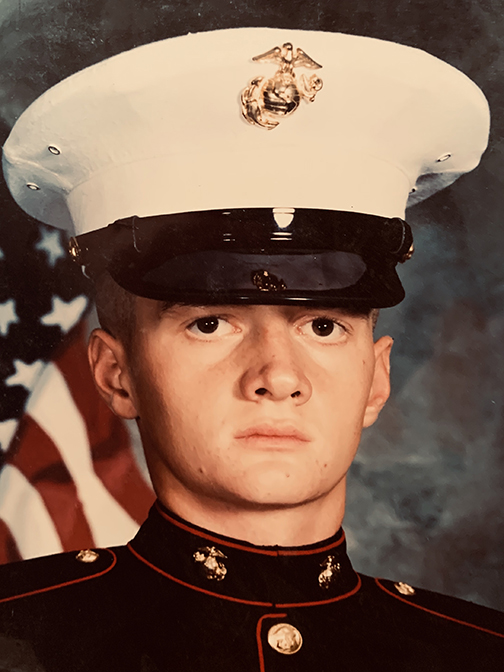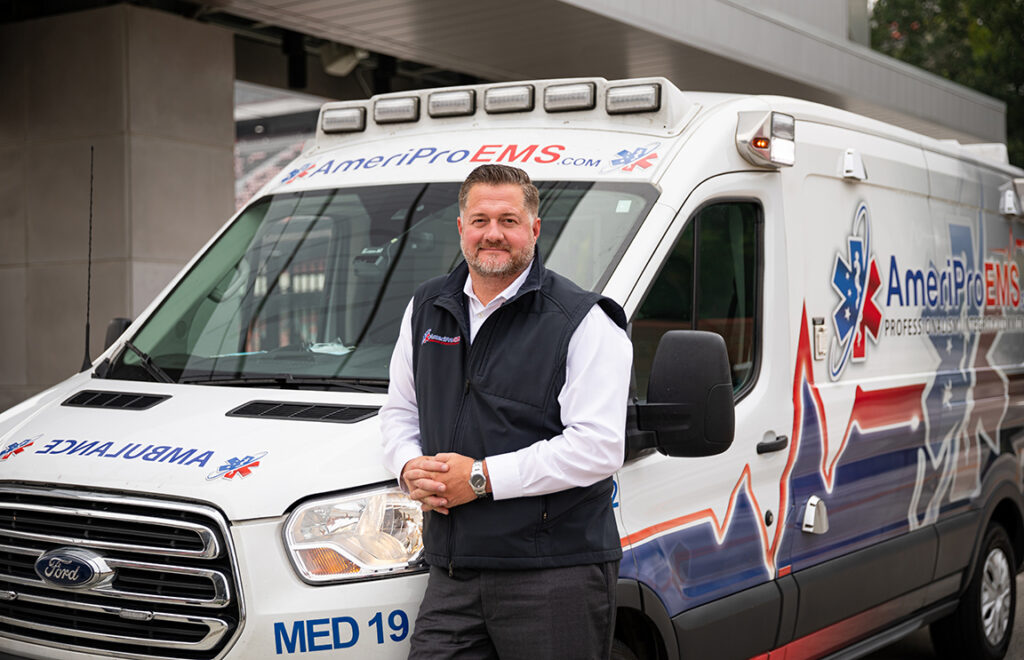When Larry Richardson began the Executive MBA program at the Terry College, he wanted to transition from years of work in emergency medical services to the business side of public safety. Little did he know then that he’d come away with far more — a business partner, a new company and an innovative service prepared to save lives during one of the most harrowing pandemics in the country’s history.
Less than four years after graduation, he’s now at the helm of a fast-growing ambulance company that could change how paramedics and emergency services groups handle data, technology, and efficient operations across the health care industry.
“I owe everything to the Terry College of Business. The day I started my graduate degree, I had been working for the government for 20 years, so my vocabulary wasn’t there in the sense of profit-loss statements, balance sheets and strategic marketing,” Richardson says.
“Learning a new world and new language was difficult and challenging, but being more mature in life, I knew where I was going and what I wanted from the program,” he says. “That active learning is what prepared me to do what I’m doing now.”
Richardson (MBA ’18) is the co-founder and executive vice president of AmeriPro EMS, an ambulance services company operating in Georgia and Florida. With a generational shift in health care in the U.S., demand is increasing for patient transportation, particularly among older patients in the Baby Boomer and Silent Generation cohorts. Across the industry, fuel prices and demand can fluctuate, but reimbursement rates for transportation services don’t — the federal government sets the reimbursement. That means to be a successful medical transportation company, optimization and asset utilization are paramount.
That’s why Richardson has focused on efficient and safe patient transportation using the latest technology for operations, communications and patient care. For instance, AmeriPro EMS ambulances are rigged with tools that track the driving habits of the team, transmit cardiac data while on the road, dispatch teams to the correct locations and reduce wait times. Richardson initially served as the COO and now is the EVP overseeing the data analytics, technology and revenue cycle to ensure the company is meeting key metrics and is positioning itself for long-term success and future growth opportunities
“The industry as a whole has never been on the cutting edge of technology, so we had to work around that by developing a data team early and building our own data platforms to dial in our efficiency,” he says. “As important as patient care is, you also have to optimize logistics and asset utilization.”
After Richardson graduated from the EMBA program, AmeriPro EMS launched in April 2018 and grew exponentially across Georgia, jumping from a handful of calls to thousands of transportation requests within months. In December 2019, the group acquired another ambulance service in Jacksonville, Florida, which was slated to lead to major growth in 2020.
Two months later, the first COVID-19 wave hit, and the demand hasn’t slowed since.
“We’re ready to expand our services and are looking at other product lines to diversify and keep going,” he says. “We want to be one of the largest ambulance companies in the country. That’s our goal and our mission.”

Innovating within Industries
Hailing from metro Atlanta, Richardson graduated from Stockbridge High School with the Class of 1995 and immediately entered the Marine Corps, where he specialized in aviation electronics and repaired airplane communications equipment. After eight years of service, he transitioned into public safety and spent nearly two decades working for public and private fire departments and EMS companies. Richardson is licensed as a critical care paramedic and nationally registered paramedic, and he holds certifications from the Federal Emergency Management Agency, American Heart Association and National Association of Emergency Medical Technicians.
During that time, Richardson married his wife Laura, and they had two children, Liam and Lyla. While the kids were both under 2, Richardson found he wanted more than a 24-hours on, 48-hours off schedule and had to do something different. He decided to prioritize his education in an effort to shift to the administrative side of the industry. In three years, he earned a bachelor’s degree in management from Clayton State University, concentrating in emergency management and homeland security all the while working full-time, taking full-time college courses and raising a family.
Then Richardson decided to take it a step further by enrolling in Terry’s EMBA program. Armed with experience in emergency services, he was pleased to work with classmates from all backgrounds — business, military, technology, health care and more. Among the cohort, Richardson met Madhurima Uppalapati (MBA ’18), a doctor with an oncology practice in Atlanta. She connected him with her husband Suhas, a serial entrepreneur who has invested in companies in health care, financial services, insurance, hospitality and technology.
“I look at antiquated industries as an outsider and find efficiencies,” says Suhas Uppalapati, who now serves as president and CEO of AmeriPro EMS. “Larry talked to me about the opportunities to modernize and improve EMS, and we combined forces to start a company, which is now one of the fastest-growing ambulance companies in the country.”
They created AmeriPro EMS to focus on high-quality patient care and efficient patient movement, not only transporting people to emergency rooms but also throughout the health care system. AmeriPro provides Critical Care and Advanced and Basic Life support transportation services. That includes moving high-acuity patients out of hospitals, between surgery centers and to recovery facilities based on their needs. As the demand for safe patient transportation continues to increase as the population grows older, they believe ambulance services can fill that gap. With technology such as onboard cardiac devices, for instance, EMS teams can monitor their patients on the road and transmit data to hospitals before they arrive.
“Looking at the entire flow of patients throughout a health care system can have a huge impact,” Uppalapati says. “That’s what excited me about changing the game.”
As COVID-19 cases began to emerge in early 2020, the AmeriPro EMS team began to prepare for infectious disease protocols and an influx of patients. Richardson had experience with disaster management from his years with the military and various EMS groups, so he knew to look ahead and gather supplies early. The company stocked up on personal protective equipment, industry leading disinfectants and planned for never-ending changes in operations as the pandemic unfolded.
“The recent Delta variant surge has probably been the worst and most taxing part of the pandemic so far due to the demand and the fatigue,” Richardson says. “Health care workers are tired, and there are a lot of long days, but our teams are so dedicated to our service, so we keep going and servicing our customers.”
Creating Connections
The rapid growth of AmeriPro EMS is also intrinsically linked with Richardson’s ability to connect with others, says Jeff Ertwine (MBA ’18), executive director of program management for Cox Communications, who was in the same Terry Executive MBA cohort and a former F-18 pilot.
Ertwine recalls the time that they first met in a hallway between classes. A classmate pointed out that they both served in the Marine Corps and wanted to introduce them.
“Larry barreled his way toward me and gave me a big bear hug,” Ertwine says. “He brought me into his inner circle, which is what he does. He’s an inclusive leader who recognizes opportunities to bring in people to get things done.”
Richardson and Ertwine have remained close since graduation, often texting each other and other classmates who continue to support one another in their business endeavors. Ertwine jokes that Richardson, like actor Kevin Bacon, is merely a few degrees of separation from any new person he meets.
“It’s neat to be part of his world and to be friends with him,” Ertwine says. “His personality fills the room, and people flock to him, yet when it comes down to business time, he’s ready to go.”
Ertwine and Richardson bonded over their common military background, particularly the foundational principles of commitment, drive and determination. Veterans who are transitioning to the civilian world need ways to translate their skills in a corporate context, Ertwine says. The Executive MBA program helped them to apply their experience in logistics and operations to business-focused contexts through accounting, marketing, hiring teams and forecasting sales.
“Not everybody is designed to be an entrepreneur. Larry has that drive to accomplish his goal,” Ertwine says. “The entire class was behind him, wanting him to succeed.”
For Richardson, the classroom connections and practical experience of the Executive MBA program have contributed to the success of AmeriPro EMS. Through case studies and group projects, he understood different backgrounds and viewpoints to focus on a problem, develop a solution and execute it. He also appreciated how the program tackled business questions from a holistic leadership perspective and on-the-ground focus on numbers.
The program emphasized major principles — such as data analytics, innovation and leadership — that he recognized from working on teams in the Marines.
“The team comes first. Through the success of your team, you complete the mission with problem-solving and discipline,” Richardson says. “There’s a saying that there’s no such thing as a former Marine, and there’s a lot of truth to that. You take the lessons you learn and carry them through all aspects of life.”

